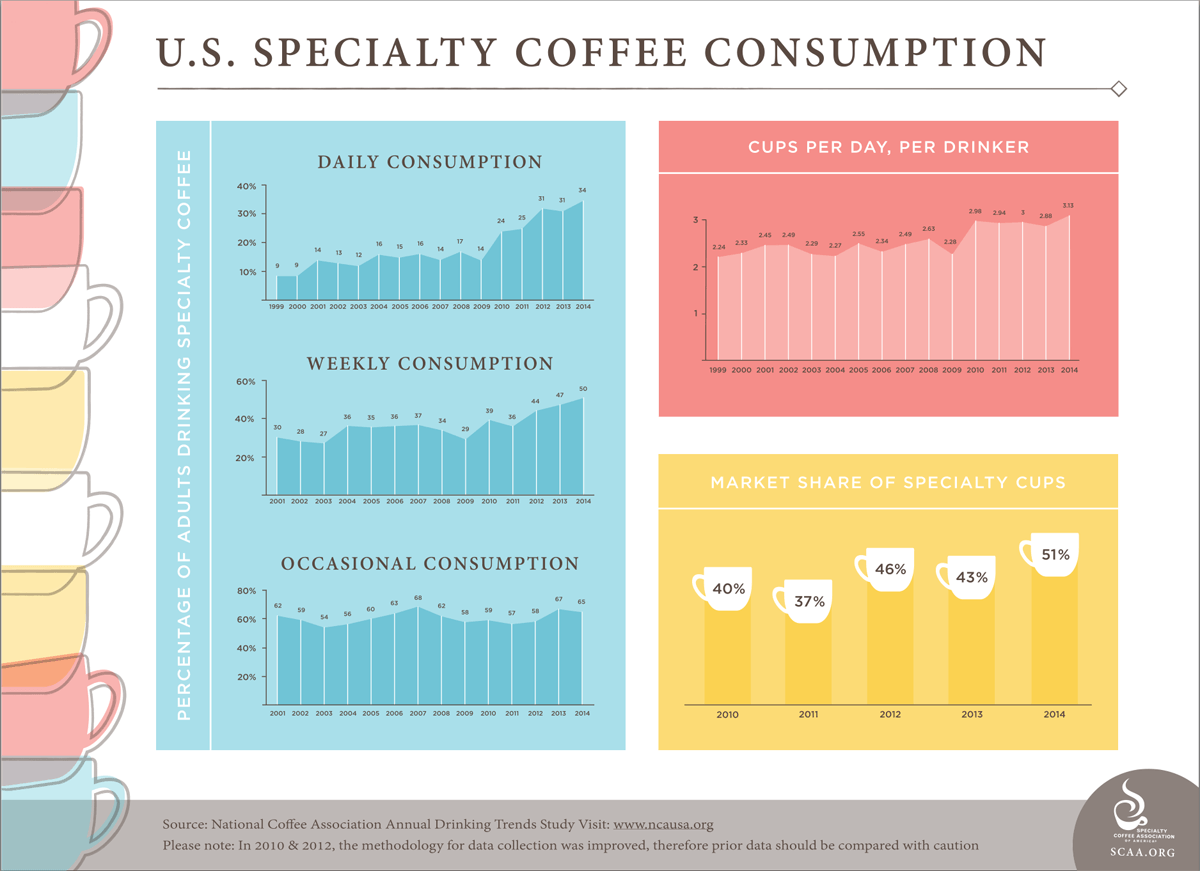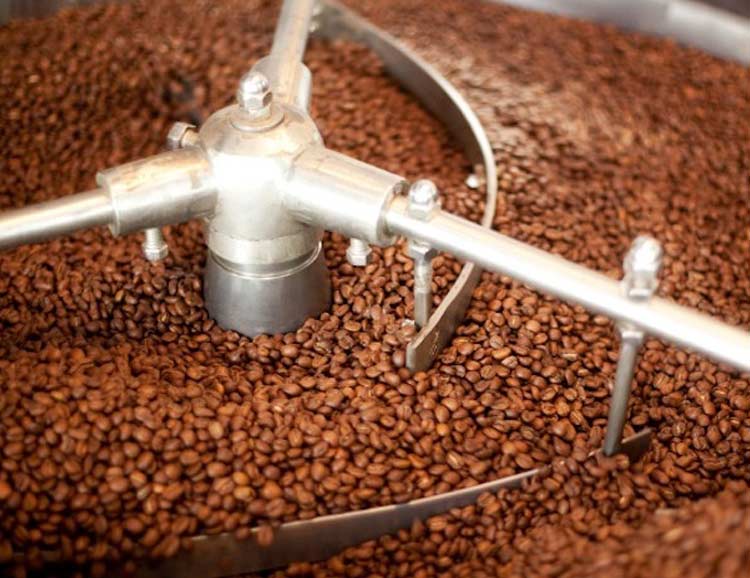10 Common Coffee Myths Debunked

Ever wondered if coffee actually does stunt your growth, or if drinking coffee will make you an addict? What about coffee’s reputation for dehydration? In today’s blog, we’ve picked out 10 of the most common coffee myths to explore with you. Grab a cup of your favorite beverage (we’re hoping that’s coffee) and let’s bust some coffee myths together. Ready? Go!
Myth #1: Decaf Coffee Has No Caffeine
Truth: Industry standard requires that at least 97% of caffeine should be removed from coffee beans in order to be called decaffeinated, but that still leaves about 7mg of caffeine in each 8-ounce cup. So yes, decaf coffee does contain caffeine. Depending on the original content and the process used, your decaf coffee could have anywhere from 1-3% of the original caffeine content remaining. Is 1-3% a lot of caffeine? No, but it can still effect on people who are sensitive to it.
Myth #2: Coffee Will Stunt Your Growth
Truth: Despite the persistence of this myth, coffee will not stunt your growth. No scientific study has shown a link between drinking coffee and a loss in bone growth for children (or even any significant calcium loss in adults). Bizarrely, most of this myth seems to come from ads run in the 1920s for Postum, a non-caffeinated coffee substitute. The claims that Postum’s producers made about coffee’s effect on children were never backed up by any scientific studies, but the myth spread quickly through parenting circles and has been keeping mom or dad’s coffee “just for adults” ever since. Will coffee affect young children in other ways? Yes, it can. Caffeine tolerance for kids under the age of 12 is much lower than it is for adults and shouldn’t exceed 100mg a day from any source. The effects too much caffeine can have on kids range from irritability and mood changes to sleep issues (especially in teens, who lose an average of an hour of sleep with regular caffeine use). So even though coffee won’t actually stunt growth, you might be wiser to let the kiddos enjoy some of our seriously delicious hot cocoa on a chilly afternoon and keep the coffee to yourself.
Myth #3: Storing Coffee in the Fridge Makes It Last Longer
Truth: Storing your coffee in the refrigerator actually exposes your coffee to moisture and odors and will result in a stale brew, even if the beans are stored whole. So no, cold storage in the fridge won’t make your coffee last longer. It pretty much has the opposite effect. It’s best to just buy what you can store in an airtight container for a reasonable amount of time in a dark, cool, dry place.
Myth #4: Coffee Will Help You Sober Up
Truth: coffee will not help you sober up, sorry. You might look and feel more alert, but coffee doesn’t reduce the level of alcohol in your blood. Even after a strong, black cup of coffee, you’re still impaired. Adding caffeine and alcohol together in your nervous system is a recipe for poor decisions with dangerous consequences. Want to know a better way to sober up? Sleep it off, and drink plenty of water.
Myth #5: Coffee is Dehydrating
Truth: While caffeine is a mild diuretic (it increases blood flow to the kidneys and results in increased fluid loss), your daily cup (or three) of coffee typically won’t result in dehydration. Why isn’t coffee dehydrating? Because your coffee is brewed with enough water to offset caffeine’s effect on your body’s fluid balance. Some studies even suggest that coffee can count toward your recommended daily water intake. However, coffee shouldn’t replace your water intake. After all, drinking 64 ounces of coffee per day would also put you at nearly twice the recommended safe caffeine limit for adults…and nobody needs those jitters.
Myth #6: Dark Roast Coffee Has More Caffeine
Truth: Bean for bean, a dark roast coffee contains slightly less caffeine than lighter roasts. The longer coffee beans are roasted, the more moisture (and caffeine, in small amounts) is removed. If you want to learn more about factors that affect caffeine content in your coffee, check out our previous blog post: Caffeine 101.
Myth #7: Espresso Has More Caffeine Than Drip Coffee
Truth: it really depends on how much espresso we’re talking about. Downing one 8oz cup of drip coffee (average caffeine content: 95mg) actually nets you more caffeine than a shot of espresso (average caffeine content: 63mg), because the shot is so much smaller by volume. However, if we’re talking ounce for ounce, an 8oz cup of espresso (8 shots!) contains about 520mg of caffeine, while drip coffee, again, only has about 95mg. So yes, by volume, espresso has more caffeine. By the way, 8 shots of espresso puts you out of the safe adult caffeine consumption zone (400mg); we’d recommend keeping it closer to 2 or 3.
Myth #8: You Have to Use Boiling Water to Make Coffee
Truth: if we’re talking about making good coffee, temperature is more important than bubbles. Water boils at 212℉ (100℃) at sea level, which is actually just a bit too hot for brewing a good cup of coffee (we’re talking filter coffees here, because espresso brewing temps are a whole ‘nother topic…so is cold brew, for that matter). Above sea level, things can get a little weird, since boiling happens before water hits 212℉. Ideally, brewing temperature should start between 195℉ to 205℉ (90.5℃ to 96℃) for the best brew. Water temps above 205℉ (96℃) will lead to over-extraction, resulting in bitter, dull, and “burnt” tasting coffee (note: the burnt taste is more typical of over-extracted dark roasts, not a result of actually scalding your coffee with water). Realistically, water taken straight off the boil (electric kettle or otherwise) will be within the ideal temperature range for filter coffee by the time it hits the grounds. However, even if it has been a hot minute since boiling has stopped, you could still make coffee…but it may not have an ideal extraction rate. Interested in learning more about coffee extraction? Check out our blog post, “How to Control Extraction: The Key to Brewing the World's Best Coffee.”
Myth #9: Coffee is Highly Addictive
Truth: okay, so we know a lot of people who start drinking coffee don’t stop (obviously we haven’t), but that doesn’t mean your morning caffeine routine falls into the “highly addictive substance” category. Despite people casually using the word “addicted” with their coffee habit, the caffeine in coffee just isn’t that kind of stimulant. Most institutions, including The National Institute on Drug Abuse, define a caffeine habit as a “dependence,” something that people can stop using without life-threatening withdrawal symptoms or self-destructive behaviors. While a mild headache and a case of the grumps on a coffee-less Monday may have you feeling pretty low, it doesn’t compare to withdrawal from an actual addictive substance. Is coffee delicious, though? Heck yes.
Myth #10: Coffee is the World’s Second Most Valuable Commodity
Truth: While this is a cool concept, especially to those of us who do the coffee thing for a living, coffee isn’t the world’s second most valuable commodity. Not by a long shot. If we’re talking about most traded products, coffee only ranked 112th in the world’s most traded commodities in 2020 (according to MIT’s Observatory of Economic Complexity), valuing at about $30 billion USD. In reality, coffee’s trade value is dwarfed by things like integrated circuits, petroleum, gold, and cars. But here’s the thing: coffee is very important to coffee farmers, to us as specialty coffee roasters, and to our valued customers and fellow specialty coffee fanatics. Even if commodity statistics put coffee 112th on the value scale, coffee will always be number one here at Driven.





